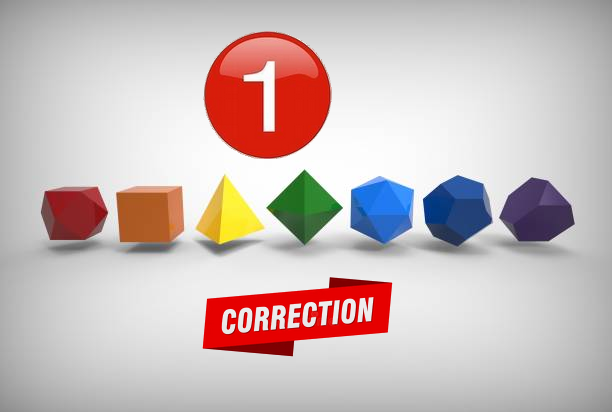Exercice 1 :
Déterminer dans chaque cas .
1.
Il n’y a pas de forme indéterminée.
En , le numérateur est majoré par 2 et minoré par 0 et le dénominateur tend vers
donc
2.
Il n’y a pas de forme indéterminée ici le sinus est borné entre – 1 et + 1
donc
Exercice 2 :
Déterminer le domaine de définition D de f puis étudier les limites de f aux bornes de D.
Il faut que et
ce qui revient à et
Conclusion :
Exercice 3 :
Déterminer la limite en et
de :
C’est une fonction rationnelle donc la limite en l’infini correspond au quotient des limites en plus l’infini des termes de plus haut degré.
et de même :
Exercice 4 :
Exercice 5 :
1. La fonction est dérivable sur
, et sa dérivée est :
On résout l’équation :
Ainsi, les solutions de l’équation sont
et
.
2. Pour qu’une tangente à la courbe soit horizontale, il faut que sa pente (c’est-à-dire la valeur de sa dérivée) soit nulle. Ainsi, les coordonnées des points d’intersection de la courbe avec les tangentes horizontales sont les solutions de l’équation
, c’est-à-dire les points de coordonnées
où
ou
. Ces points sont donc
et
.
3. Les points d’intersection entre et l’axe des abscisses sont les solutions de l’équation
. On a :
Ainsi, les solutions de l’équation sont
,
et
. Les coordonnées de ces points sont donc
,
et
.
4. On veut l’équation de la tangente à en
. La pente de cette tangente est donnée par la dérivée de
en
, c’est-à-dire :
Ainsi, l’équation de la tangente en est de la forme
. Comme la tangente passe par le point
, on a :
L’équation de la tangente en est donc :
Exercice 6 :
1. Pour étudier les limites de , on peut utiliser la forme indéterminée
(pour la limite en
) et la forme indéterminée
(pour la limite en
). On a :
On a utilisé ici la règle de de L’Hôpital (en faisant tendre le numérateur et le dénominateur vers l’infini).
Pour la limite en , on a :
La limite en du côté droit est donc égale à
.
2. On calcule la dérivée de en utilisant la formule du quotient (
) :
La dérivée est donc strictement négative pour tout
. En effet, le dénominateur est toujours positif, et le numérateur est négatif, donc la fraction est négative.
Exercice 7 :
Déterminer les limites suivantes :
1.
2.
3.
4.
Exercice 8 :
1.
2.
3.
4.
5.
6.
Exercice 9 :
1.
2.
3.
4.
5.
Exercice 10 :
Déterminer les limites de sommes ou de différences suivantes :
1.
2.
3.
Exercice 11 :
Déterminer les limites de quotients et racines carrées suivantes :
1.
2.
3.
4.
5.
6.
7. Elle n’existe pas.
Exercice 12 :
Préciser la limite des formes indéterminées suivantes :
1.
2.
3.
4.
5.
6.
7.
8.
Télécharger et imprimer ce document en PDF gratuitement :
Vous avez la possibilité de télécharger puis d'imprimer gratuitement ce document «limites de fonctions : corrigé des exercices de maths en 1ère en PDF.» au format PDF.
D'autres cours et exercices à consulter
- Suites : corrigé des exercices de maths en 1ère en PDF.
- Equations et second degré : corrigé des exercices de maths en 1ère en PDF.
- Angles orientés, repérage et polaire : corrigé des exercices en 1ère en PDF.
- Fonctions : corrigé des exercices de maths en 1ère en PDF.
- Produit scalaire : corrigé des exercices de maths en 1ère en PDF.
- Géométrie dans l’espace : corrigé des exercices en 1ère en PDF.
- Dérivée d’une fonction numérique : corrigé des exercices en 1ère en PDF.
- Statistiques : corrigé des exercices de maths en 1ère en PDF.


